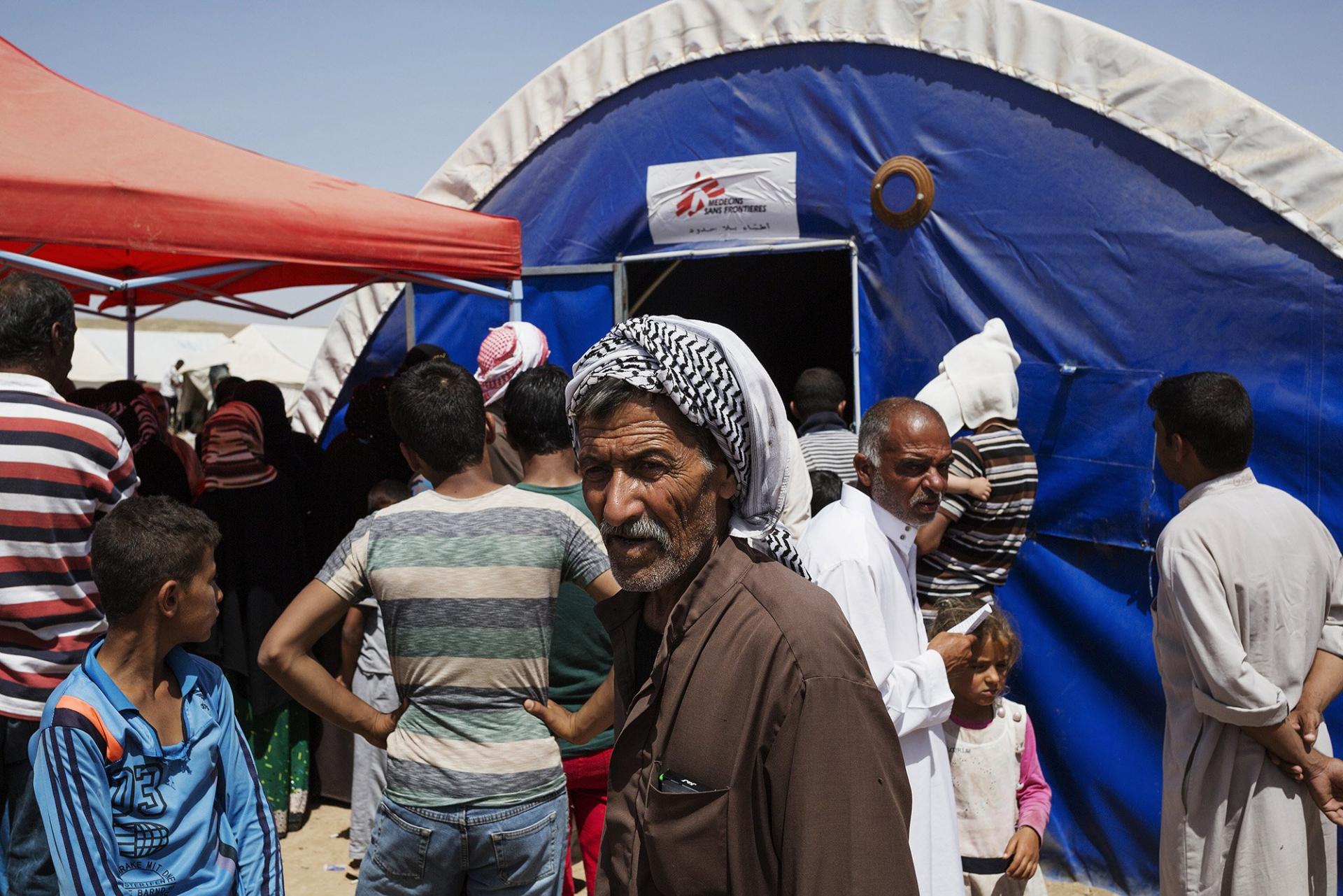Two families recently escaped West Mosul, where coalition-backed Iraq forces are battling Islamic State militants. They and their families tell Francesco Segoni, MSF project coordinator in East Mosul, about the challenges of surviving under siege.
“We had to leave. We had no choice, says Kareema. By the end, we were eating grass.” Kareema’s four-year-old niece, Rojain, sits at her side in a pink dress, listening attentively. Kareema is one of many thousands of civilians who have risked their lives in recent months to escape West Mosul.
The western side of the city, on the right bank of the Tigris River, has been ravaged by relentless fighting since the Iraqi forces moved in to recapture it from the Islamic State group in February. Kareema now lives in east Mosul, staying with a relative who works for in Al Taheel hospital, opened by MSF in March to provide surgical and emergency care.
Kareema used to work as a teacher while her husband, Said, took up occasional jobs as a labourer. Today the thought of a job - any job –seems like a dream – for Kareema and many others in the city. The past few months have been all about survival – by any means.
“The intensity of the fighting made the situation in west Mosul untenable for us,” says Said. “Whether it was an army rocket or an IS bomb, it always seemed to fall on our heads.”
Escaping wasn’t easy. At first, Kareema and Said managed to move just a few kilometers away, to another neighbourhood in the same part of the city. It offered temporary shelter, but it was only a matter of days before this area, too, became engulfed in the conflict. They stuck it out for 24 more days until they had no choice but to move again.
After a few days hiding in makeshift accommodation, they left in the early morning, on foot, finally managing to reach a safe area outside the combat zone. Arriving at a camp for displaced people, they were separated: Kareema was sent to the women and children’s area of the camp, Said to the men’s area. But after 12 hours they were reunited and allowed to make their way to their relative’s house in east Mosul. At last their ordeal was over.
Kareema and Said’s story is nothing unusual. In my months here at Al Taheel hospital with MSF, I’ve heard similar stories. Many of our patients are from west Mosul. Quite often, the first thing they do on arriving in east Mosul is to seek medical care. Some have wounds that have not been treated or have become infected; others have been hit by shrapnel.
Our patients are the lucky ones who managed to escape, but there are still some 100,000 people in west Mosul, trapped in an area of just a few square kilometers in the old town, short of food, water, and the most basic medical supplies.
Hassan, a former vet, fled west Mosul in late April with his wife, Mayssam, and their three daughters: Jouri, Ghazial and Areej.
Every morning, Mayssam would dig out her only pan and fry a little tomato paste, diluted in the little cooking oil they had left. “It was the last oil we had and I knew I could not buy any more. A bottle used to cost 1,000 dinars and now the price was thirty thousand in the black market. But that’s not even the point: it was simply no longer available. You may have had money but there was nothing left to buy.”
Every morning, Mayssam would dig out her only pan and fry a little tomato paste in the last of their cooking oil. “It was the last oil we had and I knew I could not buy anymore,” she says. “A bottle used to cost 1,000 dinars, but now the price was 30,000 on the black market. But that’s not even the point: it simply wasn’t available anymore. Even if you had money, there was nothing left to buy.”
Hassan and Mayssam had two candles for light, as the electricity had long since been cut off. She tells me the family used to huddle together in one room so as to use just one candle at a time and make them last as long as possible.
But there was one thing they were lucky with, says Mayssam: they never had major health issues. “If we had, we knew we would have had nowhere to go.”
The entire population of the besieged area depend on a few nurses, says Mayssam, who move from house to house during the short, infrequent lulls in the fighting, without any equipment and with a completely inadequate supply of drugs.
Hassan’s main concern now is for the many family members they have left behind. “We have uncles, cousins, and friends there,” says Hassan. “They are in the same desperate situation we were in. No food, no water, no medicines. We are still in touch with them by phone.”
What is really astonishing though is that both families are determined to go back to that war-torn, brutalised area of Mosul, once the fighting has finished, while fully aware of what they will find. “We are planning to go back there once it’s over, says Kareema. It will be fine once we have water and electricity again.”
Find out more about MSF's activities in Iraq
